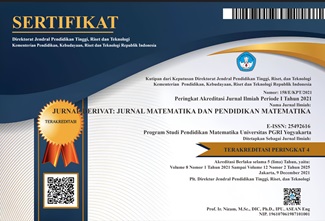Pengembangan Bahan Ajar Matematika Berbasis Daring Untuk Meningkatkan Kemampuan Pemecahan Masalah
DOI:
https://doi.org/10.31316/j.derivat.v8i1.1679Abstract
The objectives of this study are (1) to develop online-based mathematics teaching materials to improve problem-solving skills in distance learning in the pandemic era and (2) to determine the level of validation of the development of online-based mathematics teaching materials to improve problem-solving skills based on expert validation tests. This R&D research uses the ADDIE model which consists of analysis (analysis), design (planning), development (development), implementation (implementation), and evaluation (evaluation). However, the implementation in this research only reached the development stage. The subjects of this study were class teachers and 5th grade students of SD Negeri Plumutan, Bancak, Semarang Regency. The results of this study are (1) there are three stages in this research and development, namely analyzing the characteristics and initial abilities of students, planning and making teaching materials with the weebly website, and developing by conducting expert validation tests. (2) based on the validation test, material experts give a percentage of 85% with the criteria of "very good", teaching materials experts get a percentage of 90% with the criteria of "very good", and material experts get a percentage of 75% with the criteria of "good".
Keywords: development, teaching materials, mathematics, online learning, weebly
Downloads
Published
Issue
Section
Citation Check
License
Authors who publish with this journal agree to the following terms:
-
Authors retain copyright and grant the journal right of first publication with the work simultaneously licensed under a Creative Commons Attribution-ShareAlike 4.0 International License that allows others to share the work with an acknowledgment of the work's authorship and initial publication in this journal.
- Authors are able to enter into separate, additional contractual arrangements for the non-exclusive distribution of the journal's published version of the work (e.g., post it to an institutional repository or publish it in a book), with an acknowledgment of its initial publication in this journal.
- Authors are permitted and encouraged to post their work online (e.g., in institutional repositories or on their website) prior to and during the submission process, as it can lead to productive exchanges, as well as earlier and greater citation of published work (See The Effect of Open Access).







